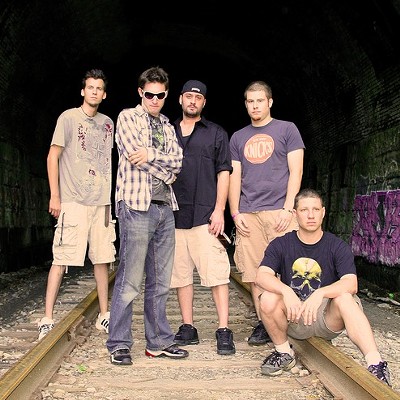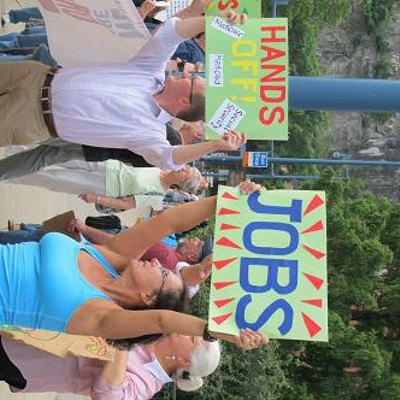Tuesday, August 2, 2011
Let the healing begin: Natural-gas referendum would force politicians to speak succinctly
Here's one reason even critics might support a referendum barring natural-gas drilling inside Pittsburgh. If the question does appear on the November ballot, someone in public office will -- at long last -- be able to make city councilor Doug Shields get to the point, already.
By state law, for a referendum to be placed on the ballot, it must be 75 words or fewer. The question in the bill sponsored by Shields, though, currently runs much longer than that.
The operative part of the measure requires county elections officials "to place before [voters] the following referendum question: Shall the Home Rule Charter be amended to include the following language ..."
The language that follows runs to more than 600 words. And the verbage doesn't just bar drilling inside city limits; it also asserts a "right to a sustainable energy future," along with rights to water and self-determination. And it threatens to revoke the permits, business licenses, and Constitutional rights of anyone who does try to drill inside city limits.
Shields is, of course, given over to such expansive discourse. It's part of his charm, as his (occasionally glassy-eyed) fellow councilors can attest. But of course, those officials are trained professionals. The law, in its infinite wisdom, does not require the same patience from innocent voters, who will have their hands full just wondering where the rest of Raja's name is on the ballot this November.
If Shields' bill does make it onto the ballot -- a decision that lies largely in the hands of Mayor Luke Ravenstahl -- the guy responsible for editing it would be Mark Wolosik, who heads the county's Elections Department.
When presented with a referendum for placement on the ballot, "We try to condense it, and provide an overview of the essentials," Wolosik says. State law requires that the ballot question conform to local officials' intent, and Wolosik says he consults with the referendum's authors while crafting the language. "We try not to be adversarial," he says.
Wolosik hasn't seen the city's proposed referendum -- that requires further action by local officials. Still, "The citizen review-board language was also pretty long," he notes, referring to a 1997 ballot question in which city voters authorized an independent agency to investigate claims of misconduct.
That ballot question itself, though, was indeed a masterpiece of economy. It asked voters whether the charter should be changed to:
Establish a seven member Independent Citizen Review Board to receive citizen complaints on police misconduct, establish mediation, hold public hearings, subpoena witness and documents’ supervise a staff and solicitor, and make recommendations to the Mayor and Chief of Police who must respond in writing.
All members will be appointed by the Mayor, 4 from a list of 9 supplied by City Council. Members must be City residents and cannot be City or Authority employees.
That's 74 words exactly.
Another ballot question that year was even shorter:"Do you favor the neighborhood school concept as a necessary part of our public school system?"
What helped keep that question succinct, though, was that it was all a pointless bit of political theater -- a "special advisory question" with no binding results, crafted by those who supported keeping underutilized city schools open. In a separate explanation of the question, county officials observed that "The phrases 'neighborhood school concept' and 'necessary part of our public school system' are not defined, and the voter will have to use their own understanding of what these terms mean in casting their vote."
Whatever you may think of Shields' bill, it's more substantive than that. Still, as somebody who edits for a living, I don't envy Wolosik the challenge of trying to pare it down.
For one thing, the review-board provisions in the home rule charter take up only about 340 words -- roughly half as much verbage as Shields hopes to add to the charter. And Shields' bill has a much larger scope, asserting a slew of inalienable rights for everyone except those who wish to drill.
I tried my hand at this, and found it only slightly easier than getting Chris Young down to a three-digit word count. Here's my first stab:
Shall the Pittsburgh Home Rule Charter be amended to prohibit Marcellus Shale natural-gas extraction within city limits, and to assert the right of city residents to water, sustainable energy, natural ecosystems and self-governance. Any person, corporation, or other entity seeking to infringe on those rights, or to engage in drilling, would have various Constitutional rights denied or revoked.
Not bad. That's just under 60 words. Plenty of room for Shields to add the word
FRRRRREEEEEEEEEEEEEEEDDDDDDDDDDDOOOOooooommmmmmm
at the bottom if he wants. Still, when you phrase the question that way, does it sound kind of ... well ... out there?
Tags: Slag Heap











